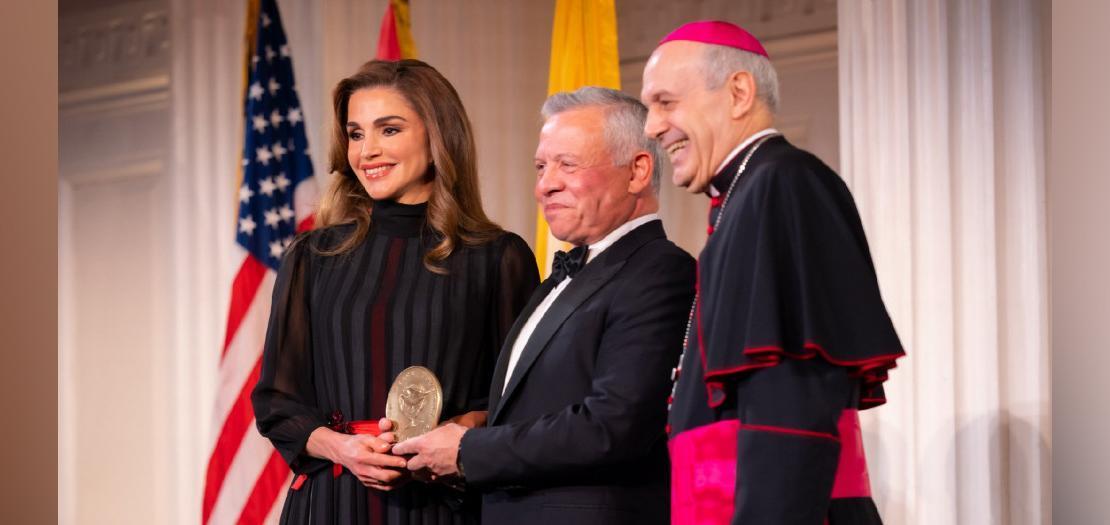Issued by the Catholic Center for Studies and Media - Jordan. Editor-in-chief Fr. Rif'at Bader - موقع أبونا abouna.org
The Path to Peace Award is Hashemite
It is not a novel event that King Abdullah II Ibn Al-Hussein receives a prestigious award in appreciation for his efforts designed to encourage interfaith dialogue and harmony, as well as to promote opportunities for the attainment of peace and receiving refugees. This award follows the time when His Majesty had earlier won "The Zayed Award for Human Fraternity" in Abu Dhabi, the "Lamp of Peace Award" in Assisi, Italy, and "The Templeton Prize for Interfaith Harmony Efforts" in Washington. This time he stands at a podium in New York, close to the headquarters of the United Nations General Assembly, to receive a new award called "The Path to Peace Award", while being accompanied by Her Majesty Queen Rania Al Abdullah.
A new impression about this award is that it is presented by the Path to Peace Foundation which was affiliated with the Permanent Holy See Mission in 1964. In 1991, the Path of Peace Foundation became an offshoot of the Holy See Mission to the United Nations. It aims at spreading the message of peace by which the Catholic Church, through the words and activities of the Pontiff or rather the Pope. The foundation, primarily directs its activities to the international stage of the United Nations, and bestows an annual award on a personality that has landmarks in consolidating the foundations of peace in the world since 1994. Boutros Ghali, the former secretary general of the United Nations, was the first person to receive it.
As we nowadays remark the bestowal of the award on His Majesty the King and Her Majesty the Queen--while UN Secretary General António Guterres received it last year--we affirm that His Majesty’s selection for receiving this award was based on several factors, including the religious nature of His Majesty’s activities by urging the international community to use the correct, healthy, and proper use of religion in the service of peace and harmony rather than in support of division and strife. This is what we have experienced in recent years when terrorist groups were dealing blows in the world, but the King Abdullah II Ibn Al-Hussein's current continued to confront these extremist currents to tell the world that religion is innocent of terrorism, and that it is in the service of peace and harmony.
We also mention the efforts of His Majesty the King regarding noble Jerusalem through his defence and his custodianship of the sanctuaries, and through urging Israeli officials and decision-makers in the world to enable Muslims and Christians to have free access and with ease to Al-Aqsa Mosque and the Church of the Holy Sepulcher, a matter that Israel did not pay attention to, but rather tightened its restrictions on all Christian worshipers on Holy Saturday and on Muslim worshipers during the month of Ramadan. The voice of King Abdullah II, as has always been, was a firm supporter of the Palestinians and in defense for them in order to obtain their basic rights, the most important of which, of course, is free access to places of worship.
Furthermore, we should not forget the role that Jordan played, during the reign of His Majesty the King, in hosting the displaced brethren from Syria as well as from Mosul, who came while being in danger due to religious persecution. Jordan welcomed them with open arms, and provided them with all their needs not only in terms of food, water, medicine, and accommodation, but also allowed them to proceed with their faith in peace and stability.
This is neither the first award that His Majesty King Abdullah II and Queen Rania Al Abdullah have received, nor will it be of course the last one. Yet, this time it is the appreciation of the entire Catholic Church in the world, led by His Holiness Pope Francis, of the pivotal role played by His Majesty the King in demonstrating the sublime image of religion in the service of peace, and in defending religious freedom and the Christian Arab identity by working hard to protect the sanctities in noble Jerusalem and to ensure free access to believers.







